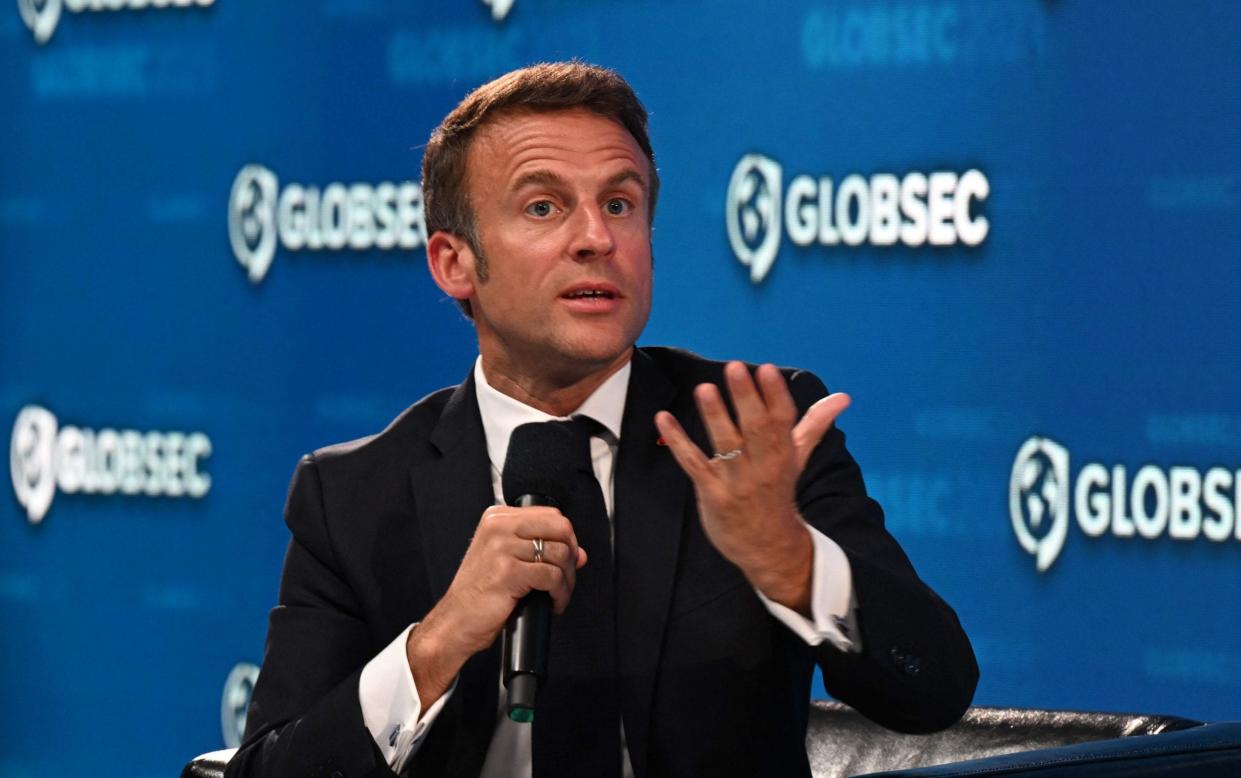President Macron tells Eastern Europe he should have listened on Russian aggression

Emmanuel Macron admitted to Eastern European nations he should have listened to their calls to take the threat from Russia on Ukraine more seriously, saying: “We lost an opportunity to listen to you”.
The French president was criticised for trying to talk Vladimir Putin out of invading Ukraine while appearing to dismiss warnings from Eastern Europe and the UK of impending Russian aggression.
“Some said you had missed an opportunity to shut up. I think we also lost an opportunity to listen to you. This time is over,” Mr Macron said to applause during a speech at the Globsec security think tank in the Slovak capital, Bratislava.
He was alluding to a remark in 2003 by then-French President Jacques Chirac, who said East European nations who backed the United States and Britain’s decision to invade Iraq - opposed by France and Germany, among others - had missed a “good opportunity to shut up”.
The remark turned relations frosty between East European countries, which is what again happened after Russia invaded Ukraine in February 2022.
“I don’t think there is a western and an eastern Europe, an old Europe and a new one; there is only one Europe… with a will to build unity,” he said.
Mr Macron insisted that Russia had lost all legitimacy and that Ukraine won’t be conquered.
’A geopolitical failure’
“We can see that what was supposed to be a ‘special operation’ is already a geopolitical failure,” he said.
However, he added that if Ukraine’s coming counteroffensive failed to meet its military objectives and the “war lasts I think at that time, we will have to reassess the situation to see how to calibrate our support”.
At the same time, he insisted that Ukraine was defending not just its own borders, but “protecting Europe” and that any ceasefire would play into Russia’s hands. “Time will be on Russia’s side” in that case, he warned.
“We must be clear: A ceasefire is not enough, we will recreate a frozen conflict that will be another war for tomorrow,” he said.
“We need to help Ukraine lead an efficient counter-offensive.”
The French president said that the West must offer Ukraine “tangible and credible” security guarantees, stressing that it is in the West’s interest that Kyiv have security assurances from Nato.
“That is why I’m in favour, and this will be the subject of collective talks in the following weeks... to offer tangible and credible security guarantees to Ukraine,” he added.
His comments will likely be read as a nod toward many Eastern Europeans who think Ukraine’s allies should send positive signals on its bid for Nato membership.
Full membership for Ukraine
While Mr Macron said it was unlikely there would be consensus on full membership for Ukraine, he said: “We have to build something between Israel-style security guarantees and fully-fledged membership.”
Mr Putin’s belligerence gave the alliance a jolt when it invaded Ukraine last year, he added.
“I had a harsh word for NATO in December 2019,” said Mr Macron, recalling how he had called the alliance “brain dead” at the time. “I can say that today Vladimir Putin jolted it awake with the worst of electric shocks,” he added.
Mr Macron also said that while America’s contribution to defending Ukraine was crucial, Europe should build up its own defence industry and not only rely on the US for protection.
“Let’s be grateful and say thank you to the United States. But is this administration here forever?” Mr Macron asked. “That’s why a European defence pillar in Nato is indispensable.”
The US has presidential elections next year with Donald Trump - who as president said European nations should pay more for their own defence - a serious contender.
“A Europe of defence, a European pillar within NATO, is indispensable. It’s the only way to be credible... in the long-term,” he said, adding that it was “up to us Europeans to in the future have our own ability to defend ourselves.”

 Yahoo Movies
Yahoo Movies 
